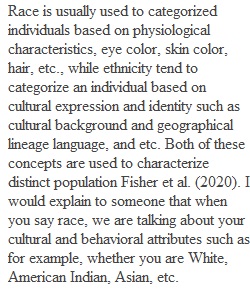


Q The readings and videos in this module present diverse perspectives on race, ethnicity, human health, and health services. On the one hand, some authors and presenters argue the importance of placing people in racial and ethnic categories in order to predict health risks and develop accurate health profiles; on the other hand, some of them argue we risk doing more harm than good when we base healthcare assessments and service recommendations on racial or ethnic profiles. You will have an opportunity to explore both sides of this issue in this week’s discussion, as you further expand your understanding of what it means to provide culturally and linguistically appropriate services (CLAS) in health care settings. Part I: The first part of this week’s discussion is based on your own thoughts and experiences and does not require you to complete any of the learning materials prior to joining the conversation. Do you find people use the terms "race" and "ethnicity" to mean something different from each other, or are they used interchangeably? How would you explain to someone the proper use of these two terms? Does one term hold more significance for you? If so, why? Please post your opinions by Wednesday of this week. Evaluate Part II: In the second part of this week’s discussion, you will be required to meaningfully integrate your assigned module readings and videos to answer the series of questions below. • The Sussman article in this week's and the Harris and Roberts videos on the myth of race present the case for race being a cultural construct related to historical attempts to control certain groups rather than that of an actual biological condition. What is your reaction to this? • The Tulane blog and the TED Talks by Williams and Irving present compelling cases that racism perpetuates serious health disparities, decreased longevity, and higher infant and child mortality in U.S. society. The Roberts video presents arguments against race-based medicine. What did you find most shocking or surprising in these presentations and what action(s) do you feel should be taken to change this? Please support your discussions with specific references to some of the learning materials. • Near the end of this module, reflect on the most significant learning you gained from this week’s learning materials and discussion on race and ethnicity as it relates to health and health services. What is the one thing you will most remember? What is one thing you would recommend health professionals do to decrease racial and ethnic health disparities? Part II is due between Wednesday and Saturday. Responses to peers are required and must be posted before Sunday at 11:59 pm ET. The goal of this discussion is to generate an ongoing discussion with your peers' throughout the week.
View Related Questions